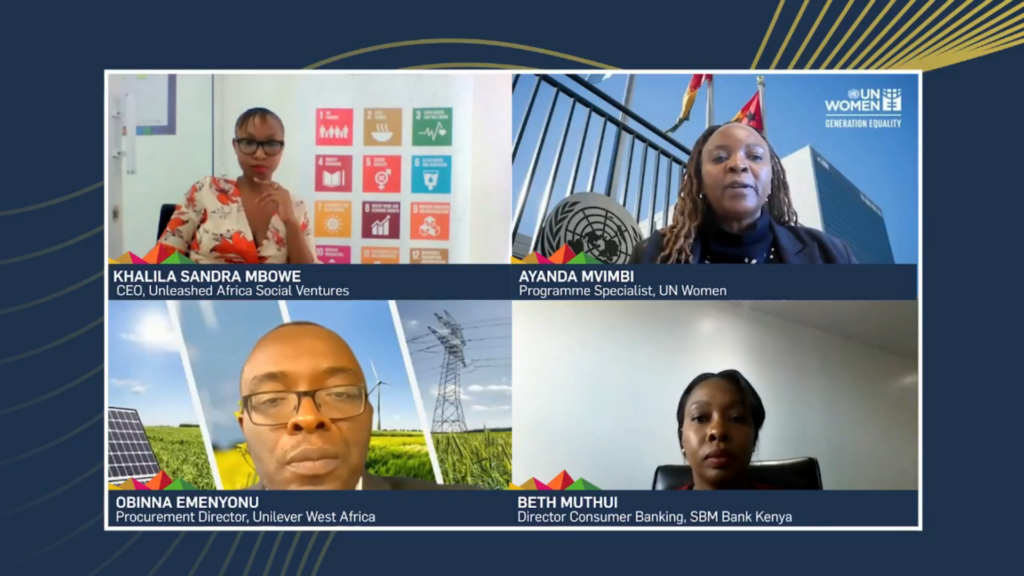Accelerating Change in African Supply Chains: From Inclusive Procurement to Gender Responsive Procurement – Leaders Summit Session 2022

“Accelerating Change in African Supply Chains: From Inclusive Procurement to Gender Responsive Procurement” live from UN Global Leaders Summit floor.
Featuring Khalila Sandrah Mbowe, Chief Executive Officer, Unleashed Africa Ventures; Beth Wanjiru Muthui, Director in charge of Consumer Banking division, SBM (State Bank of Mauritius) Kenya; Ayanda Mvimbi, Programme Management Specialist, UN Women in the South Africa Multi-Country Office (MCO); Obinna Emenyonu, Procurement Director, Unilever West Africa.
- Gender-responsive procurement (GRP) can have a transformational impact on domestic and international economies and contribute to women’s economic empowerment.
- The aim of this session is to highlight how gender-responsive procurement creates social and economic value amid increasing economic uncertainty.
- The session will focus on the interlinkages between favouring gender-responsive enterprises through procurement practices and businesses that have fully integrated gender equality and women’s empowerment principles in their policies and practices.

Ayanda Mvimbi lead an inspiring panel on promoting women and women businesses in Africa. As Mvimbi pointed out, “businesses does not need permission from the government” to encourage and foster women and women businesses in Africa. The journey is an uphill task, but businesses lead the way as they provide resources and opportunities for women. And in turn, women partnerships attract brand loyalty. When women see other women advocating for them, it opens the door for even more opportunities.
From the panel
Khalila Sandrah Mbowe (Chief Executive Officer, Unleashed Africa Ventures)
- As a female owned business, I found that it was easy to employ women. I ended up noticing that our team of employees is fully female, but our service providers was fully male. We need to push for equality.
- There’s a large gap on skills. We need more development programs that largely focus on build up skills for women businesses with on the ground support. This will translate into the work space.
- One of the major barriers is it’s hard to find women owned businesses. It’s easier to come up with a male owned business than a female owned business. “When it comes to young women, the barrier is even higher.” We need to create a platform like “WEConnect” in Africa.
- “Find a voice and use your voice.” Our male counterparts are very quick to promote themselves. Women businesses need to push themselves out there. It’s important to be aggressive and bold. Bold to push the agenda to stand out.
- “When we’re talking GRP, we’re talking about building the capacity for women to compete. This is a conversation that largely focuses on large corporations. My call is we make sure we bring in the start ups and smaller companies so they are engaging in this conversation.”
Beth Wanjiru Muthui (Director in charge of Consumer Banking division, State Bank of Mauritius, Kenya)
- We need tangible outcomes and not just opportunities.
- Education is the most important. It begins at the top.
- “Quantifying the benefits of working with women business is an uphill task.” Measurements provide a strong case to encourage organizations to go the route of enhancing GRP processes. There is real benefit out of it. The huge uphill task of leaders is to make sure leaders see the positive association of driving GRP.
- Women partnerships attract brand loyalty.
- Women enterprises tend to be smaller because of lack of skill and that “is really the elephant in the room.”
- There’s need for organizations to offer enterprises to allow women to compete and foster gender responsive practices.
Obinna Emenyonu (Procurement Director, Unilever West Africa)
- Businesses must allocate financial resources for women. It’s about making sure you have the funds available, access to training and capital, and role modeling and advocacy outside of the org.
- Partner with other organizations to identify women owned businesses in the landscape. Build or expand partnerships with women businesses and women entrepreneurs.
- Key components: networking, mentorship, and role models. It’s important when women see other women advocating for them.
- “It’s very clear in the African continent if we are to surmount out biggest economic challenge is to empower women and empower women owned businesses.”
- “Once one women-owned businesses does it, it opens the door for others.”
This article is part of a series covering the UN Global Compact Leaders Summit. The UN Global Compact (UNGC) Leaders Summit is an annual convening of global stakeholders from the UN, the public and private sectors, and civil society that takes stock of progress of the SDGs so far, and addresses the gaps in knowledge, resources, and funding. The 2022 Leaders Summit, like last year’s summit, will be a hybrid event of live and virtual speakers. Featured venues this year include an in-person event held in Bangkok, as well as virtual plenaries in Latin America, Australia, East Asia, the Middle East, and Africa, in addition to UN Headquarters in New York. This inclusive global event — which will run continuously for more than 24 hours — aims to empower business leaders at every level to take collective action and inspire future leaders to embed a sustainability mindset in their work. ESG News is the exclusive media partner of the event, and will cover all 26 panels. To read all of the articles in the series, visit here.
Event Details
Day/Time of Panel: Day 2; 7:00am EST
Sequence of Panel: Last panel of Day 2






